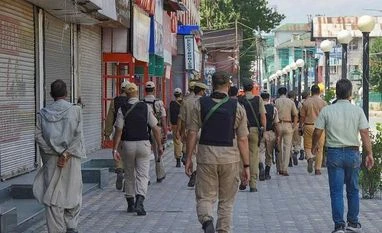Article 370: Ahead of polls, Labour Party steps in to calm Indian diaspora
The Indian diaspora, estimated to represent over 1 million votes in a UK election, were seen as being alienated by Labour since the motion was passed.
)
Policemen patrolling at Lal Chowk after restrictions were lifted in Srinagar on Tuesday | Photo: PTI
Britain's Opposition Labour Party has stepped in to counter its perceived anti-India stance to urge that the Kashmir issue not be allowed to divide communities in the UK in the lead up to the December 12 general election, in the wake of protests from sections of the Indian diaspora.
The Chair of the Labour Party, Ian Lavery, issued a letter to stress that Kashmir is a "bilateral matter" for India and Pakistan and that the party is opposed to external interference over the issue, as had been implied by some of the wording of a controversial emergency motion passed by the party at its conference in September.
"Kashmir is a bilateral matter for India and Pakistan to resolve together by means of peaceful solution which protects the human rights of the Kashmiri people and respects their right to have a say in their own future," reads the letter issued by Lavery dated November 11.
"Labour is opposed to external interference in the political affairs of any other country. As an international party, our concern is to ensure respect for the human rights of all people in the world, regardless of where they live," it notes.
Acknowledging the "sensitivities" that exist over the situation in Kashmir, the Labour candidate who has been a Member of Parliament for Wansbeck in the north-east England since 2010 stressed that his party holds the Indian diaspora in the "highest regard".
Also Read
"We recognise that the language used in the emergency motion has caused offence in some sections of the Indian diaspora, and in India itself. We are adamant that the deeply felt and genuinely held differences on the issue of Kashmir must not be allowed to divide communities against each other here in the UK, his letter says.
"The Labour Party will not adopt any anti-India or anti-Pakistan position over Kashmir," it adds.
The letter follows growing concerns around the party's motion in the wake of the Indian government's revocation of Article 370 to withdraw the special status of Jammu and Kashmir, something India has stressed is an internal political matter and not open to international intervention.
Respect British Indians, an umbrella group claiming to represent over 100 British Indian outfits set up on Twitter to lobby Labour Party Leader Jeremy Corbyn to withdraw the resolution, had drafted a "pledge" for every British politician contesting the December election to commit to revoking the "partisan and ill-informed" motion passed by the party at its conference in September.
The Indian diaspora, estimated to represent over 1 million votes in a UK election, were seen as being alienated by Labour since the motion was passed. The party's Indian-origin candidates have been urging voters not to be swayed over the Kashmir issue in the election next month.
"Kashmir is a matter for the people of Kashmir and all conflicts must be resolved within the law and Constitution of India, said Virendra Sharma, who is contesting again from Ealing Southall constituency from west London a seat he has held for the party since 2007.
"I don't think we are made better off as a country by continuing the divisions of our homelands, instead we should focus on Britain today," he said.
Fellow Labour colleague, Tanmanjeet Singh Dhesi, who is contesting from Slough in south-east England, also urged voters in Britain not to fall prey to "divisive" messages doing the rounds on social media.
"The Labour Party is not anti-India, anti-Pakistan, or anti anyone else. We merely stand up for and have always stood up for the human rights of all," said Dhesi, the first turbaned Sikh MP voted into the UK Parliament in 2017.
Some of the anti-Labour messages doing the rounds on WhatsApp and Twitter include attacks on the party as being anti-Hindu for not condemning protests organised by pro-Pakistani groups in London.
But experts believe such messages often emerge ahead of a General Election but voters ultimately cast their ballots on much wider issues.
"British elections often see noisy, self-promoting claims about the ability to deliver ethnic minority voters en bloc to swing seats from one party or another but these rarely stand up when the votes come in, said Sunder Katwala, Director of the British Future think tank.
More From This Section
Don't miss the most important news and views of the day. Get them on our Telegram channel
First Published: Nov 12 2019 | 4:30 PM IST


